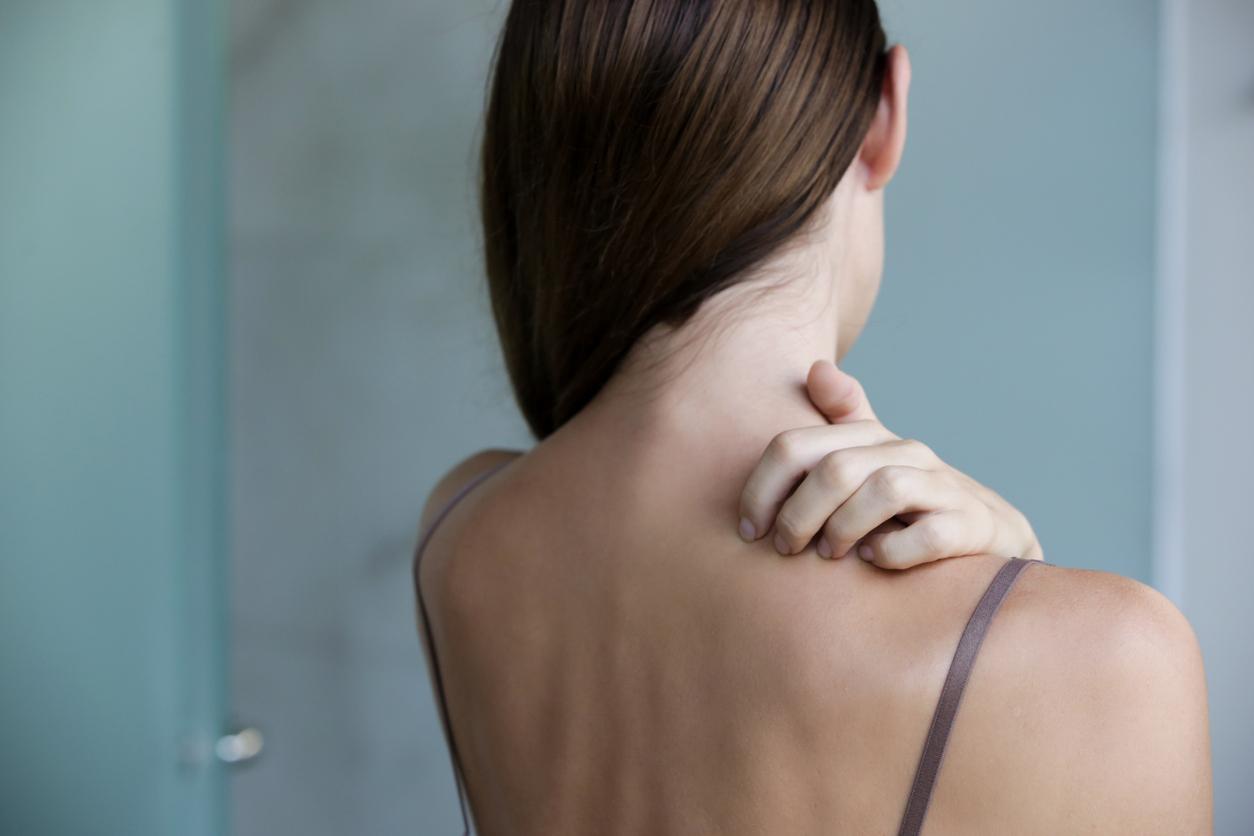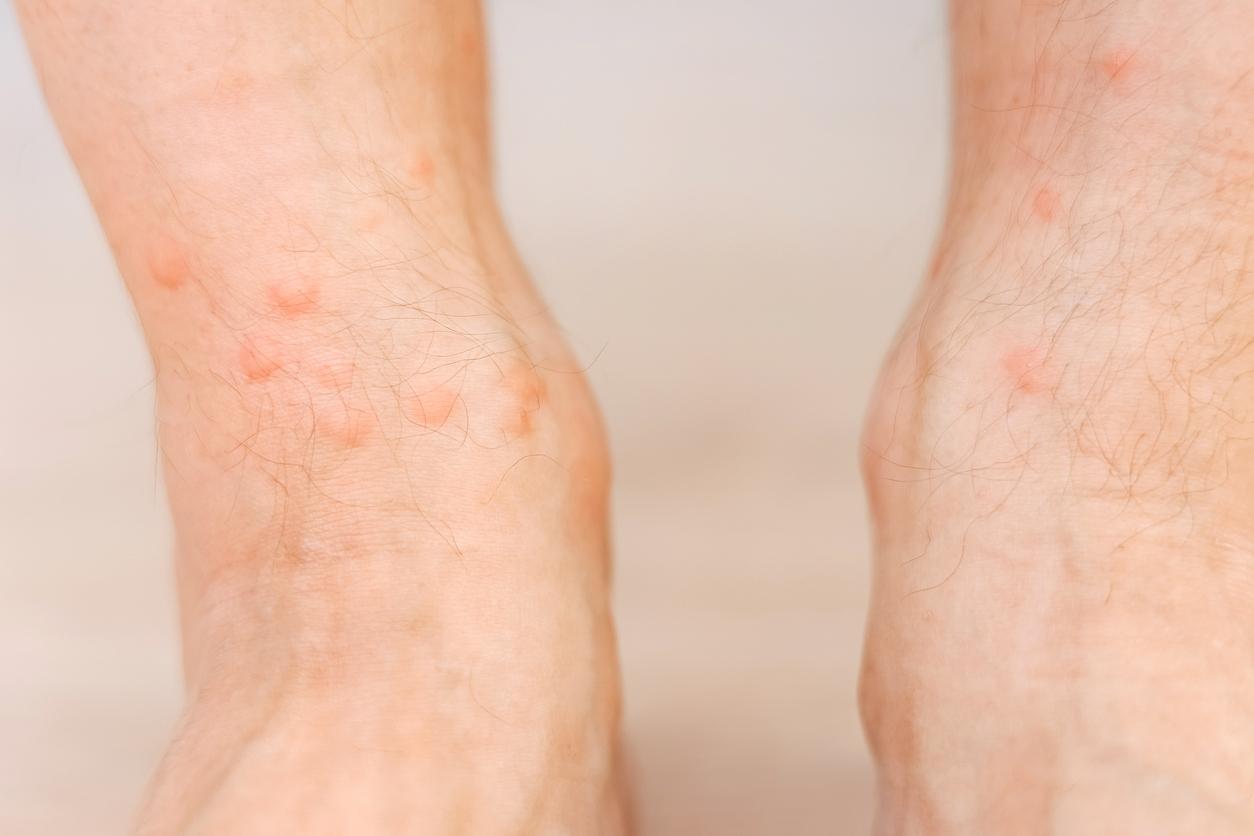What are the symptoms of hives?
L’urticaria is defined by a set of symptoms that affect the skin, explains Dr. Pascale Mathelier Fusade, dermatologist-allergist. They appear as raised, well-demarcated, migrating red patches (they move rapidly throughout the day on the arms, legs, torso, and face), itching and varying degrees of swelling on the hands, feet and face.
The starting point is a hyperactivity of certain cells, the mast cells, which react by releasing histamine in the skin, which is responsible itches, plaques and swellings. A push ofurticaria usually lasts from a few hours to three or four days.
How do you get hives?
Most of the time we think wrongly it’s an allergy. However, you should know that 95% of hives are not allergic (no release of IgE antibodies or immunoglobulins), even if there is a edema, especially in the face. The causes can be multiple: cold, heat, friction, pressure can trigger urticaria, which is then called physical urticaria. But urticaria can also develop following an ENT inflammation, a state of fatigue, takingaspirin or an anti-inflammatory, without it being an allergy, explains the dermatologist. Of the thyroid problems or certain autoimmune skin diseases may also be contributing factors.
In fact, the longer hives last, the less risk there is of it being allergic, notes the doctor. You can therefore have manifestations of urticaria for two, three or even five days without it being worrying.
Hives can be serious?
Urticaria worries a lot, not only because it is spectacular, but also because of its duration and especially because of the swelling of the face (lips, eye, tongue…), which it can cause. The seriousness is only real for urticaria of allergic origin, when the allergen has been introduced into the body in the preceding hour.
When she is allergic, this condition usually lasts only a few hours and must be taken care of quickly. L’allergic origin is usually identified by questioning. It occurs following the absorption of a food(strawberryshrimp, raw fish, etc.) or medication or even after a wasp or bee sting.
How to calm the itching of hives?
During the consultation, we prescribed antihistamines, between one and two tablets a day, which are very effective and provide relief in a few hours. The antihistamines over-the-counter also work very well. The plaques and itching disappear quickly. These drugs have few side effects, can be taken for a long time (in case of chronic urticaria) and are also suitable for children and pregnant women.
What is the treatment for hives?
You should not have the reflex to take cortisone immediately, continues the doctor. However, this is what some patients do when there is edema. Because, corticosteroidsare only active after a minimum of four hours. They are therefore not drugs to be taken in an emergency.
The antihistamines act faster. This also applies in case of oedema. In addition, in case of prolonged intake of cortisone, an addiction can set in quickly. The body then calls for corticosteroids. If he doesn’t have any, he risks producing hives again. Creating a situation that is then difficult to get rid of. On the other hand, in the event of proven allergic urticaria, the patient must have at his disposaladrenalinethe only drug capable of rapidly controlling an allergy.
How long does hives last?
Acute urticaria lasts three or four days, which is the most frequent. It can also be chronic and last for at least six weeks. The average duration of chronic urticaria is two to three years. It remains rare and fortunately affects only 0.5 to 1% of the population. Antihistamines are then prescribed at the minimum effective dose to “contain” the hives for as long as necessary. The urticaria gradually becomes less active: the symptoms lessen, then disappear spontaneously.
What is chronic urticaria?
This inflammatory skin condition manifests as raised red patches. It is not of allergic origin and can be triggered by a viral infection, certain medications, cold, pressure on the skin…urticaria may occur every day, or persist 2 or 3 days a week for more than 6 weeks. It usually appears suddenly and disappears after a few months or years. The French Society of Dermatology estimates that 40% of these chronic forms persist after 1 year, 30% after 2 years and 20% after 10 years. Unlike acute urticaria, which can be serious in case of allergy, it is almost always benign.
Can stress cause hives?
Yes, by releasing neurotransmitters that bind to mast cells, which in turn releases histamine, stress promotes the appearance of hives. Moreover, it is known to aggravate the symptoms. The relaxation techniques (sport, sophrology, yoga…) are recommended to limit recurrences and reduce symptoms. If you have already had hives, it is also better to quickly treat the ENT infections (colds…), dental abscessesavoid certain drugs such asaspirin and the anti-inflammatories and… the fatigue ! The manifestations of urticaria will be much less significant.
Are there families with urticaria?
Yes, there is undoubtedly a family ground. We know in particular that urticaria is more frequent in atopic adults and children, who suffer from asthma, hay fever oreczema.
Read also :
- Urticaria: how to relieve it faster?
- Urticaria: it is sometimes allergic
- Treat small skin sores with calendula














